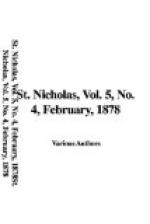The next morning, at an early hour, Akong’s great mandarin, or house-boat, was moored at the jetty, and the boys were packing away the provisions and the charcoal for cooking, and long strings of copper “cash” to be used in the purchase of eggs and chickens, and the mats of rice that would form the principal article of “chow-chow” for the crew. Everybody in China has a boy, and Charley had his; a regular young imp of a fellow of about his own age. Aling was his name; Charley used to call him Ting-a-ling, and would jabber horrible Chinese to him by the hour. Aling jumped down the steps, two at a time, with Charley’s traveling bag; but Aho, more sedate and dignified, marched after him; Charley and I joined Akong in the front of the boat, and with a chorus of “chin-chins” from the coolies and house-servants left behind, and the explosion of a pack of fire-crackers to propitiate the river dragon, the boat was shoved from the jetty, the sail hoisted, and we were soon slowly stemming the broad current of the Yang Tsze. On our right was Hankow, with its million or more inhabitants, the hum of the great city following us for miles; and the mouth of the Han, its surface so covered with junks that their masts resembled a forest, and only a narrow lane of water was left for the passage of boats. Just beyond the Han was Han Yang, once a fine city, but now in ruins, one of the results of the Tae-ping rebellion. Across the Yang Tsze, here a mile wide, was Wuchang, the residence of the viceroy of the Hupeh province. This place was supposed to be closed to foreigners, but Charley and I had made many a secret visit, and had some rare sport among the curiosity shops, with occasionally an adventure of a less pleasing description, about which I should like to tell you if I had time.
Rapidly we passed the suburbs of these cities, and drawing over to the south bank, as the wind was light, the crew were ordered ashore, and stretching themselves along a tow-rope extending from the mast-head, the boat was soon moving quite rapidly. And that reminds me that I have not yet described our boat. These boats, used by the gentry in transporting themselves about the country, are almost like Noah’s ark on a small scale—a boat with a house running almost the entire length of the deck, with little latticed windows on the outside, and the interior divided into rooms for eating and sleeping. The crew all lived aft on the great overhanging stern, where the cooking was done, and where the handle of the great “yuloe,” or sculling oar, protruded. In front of the cabin was a little piece of deck-room where Charley and I had our camp-stools, and which gave us an excellent place from which to observe everything going on ahead.




